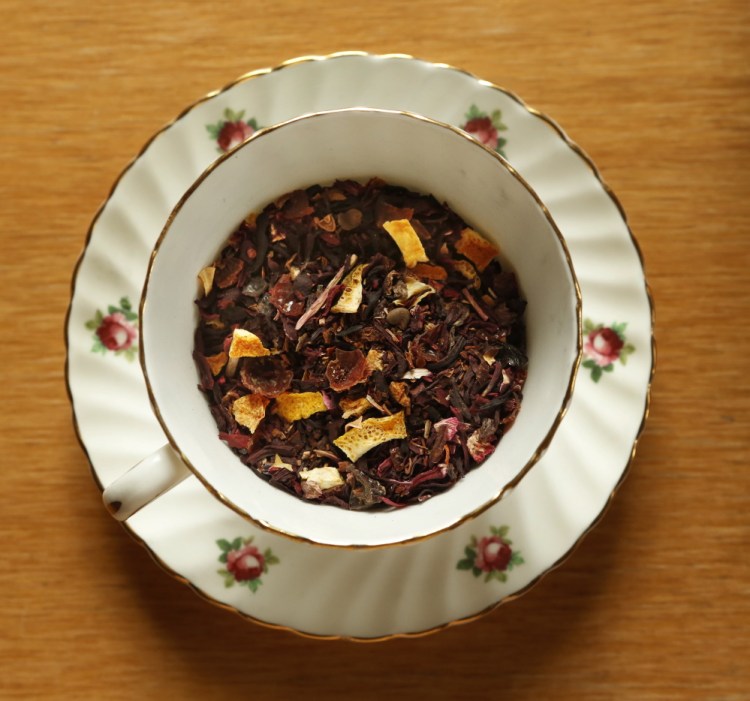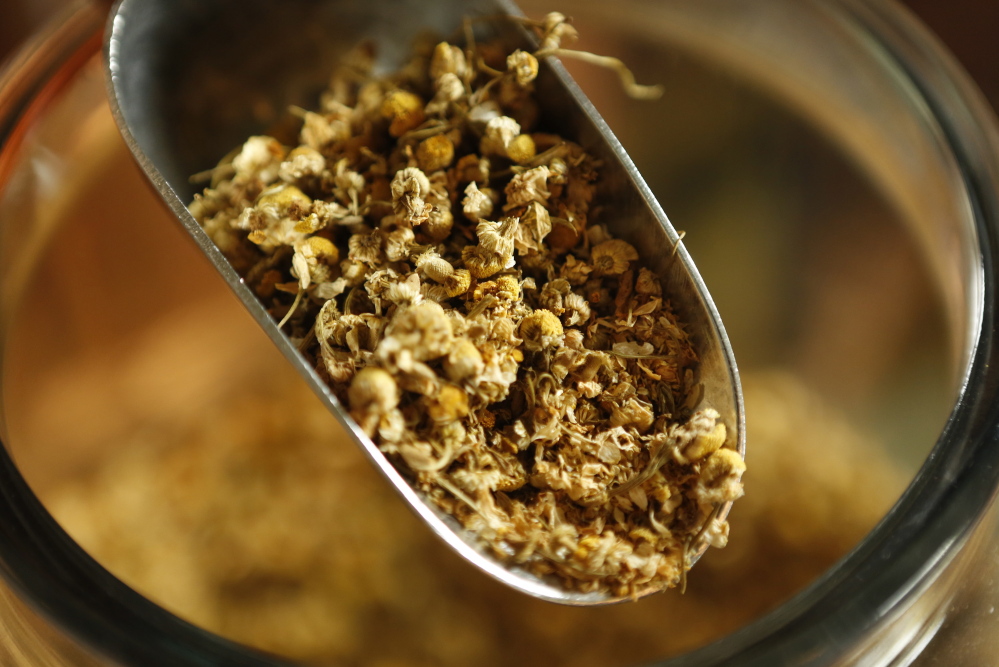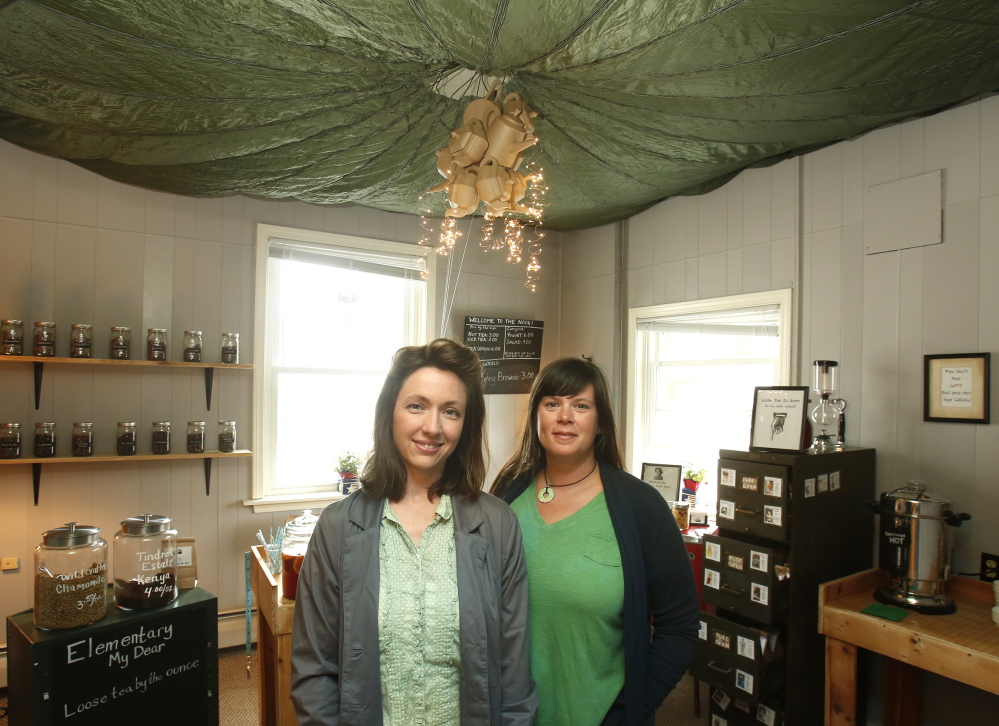Men’s Health Magazine this spring named Portland the American city with the most coffee drinkers. In 2013, Portland landed the No. 8 spot on a list of best coffee cities in a 2013 Travel + Leisure survey. The statistical basis for the first ranking is unclear – obviously it’s a matter of per capita – but few would debate either ranking after a trip to the city’s Tandem Coffee Roasters, where coffee cultists dutifully wait for their purist fix in front of a lineup of individually filtered cups.
Then, Martin Connelly steps up to the bar and asks for a pot of tea. Not just any tea either, but one of the half-dozen or so he and his parents have been importing from China to Maine, branded as Little Red Cup and sold in brown paper sacks emblazoned with a label derived from a Chinese Cultural Revolution poster.
When the pot arrives and a move is made to put milk and sugar in it, the 26 year old who grew up in Brunswick but now lives in Portland with his wife and baby, issues a friendly but firm recommendation. “I wouldn’t do that,” he said.
The tea is the ultimate basic black, the kind of simple tea that Connelly says a taxi driver in Beijing might drink all day from a pot propped in the front seat next to him. And the tea is meant to be drunk as it would be in China: no milk, no sugar, the polar opposite of the more typical Earl Grey or chai that Americans tend to know best. Connelly doesn’t mind admitting to being “somewhat evangelical” about that.
“One of the things we’re selling is a Chinese cultural experience,” he says.
There is a built-in incongruity to a Maine-based tea company, at least the ones that deal in true tea (versus herbal), be it black, green, yellow or white. The crop can’t be grown in this climate. But Connelly has plenty of company in his desire to spread the culture of tea in Maine. Just because it can’t be grown here doesn’t mean tea can’t be blended, packed and branded as a Maine product by local entrepreneurs who are capitalizing on the growing national interest in teas that go way beyond a Lipton’s teabag.
America still drinks most of its tea iced, about 85 percent, according to the Tea Association of the USA, Inc., which has 14 members in Maine. But consumer desire for loose leaf teas steeped in a pot, is growing rapidly, industry observers say.
There’s the health component; tea is both gentler on the system than coffee and is thought to have various benefits to the body, including possibly lowering the risk of heart disease and some cancers. Perhaps there is some element of rebellion against the ubiquity of coffee, a market force that has seen Starbucks march eastward and, now, Dunkin’ Donuts heading westward. With coffee at what some would argue is a saturation point, Starbucks is looking for the next hot-hot beverage. In 2012 the Seattle-based company purchased the Teavana tea company for $620 million. “We will do for tea what we did for coffee,” Starbucks chief executive Howard Schultz told the Wall Street Journal at the time.
To those factors, add a fascination with all things locally made (or blended and packaged). Tea Maineia opened in Winterport in October, and the Tea Nook in Stonington in April. The latter is the retail home of the fast-growing Tempest in a Teapot line. Chai Wallahs of Maine began as an offshoot of a farm stand on the Blue Hill peninsula and now sells online and in 30 outlets in the state. In Hallowell, former music teacher Cassandra D’Alfonso sells tea and coffee online under the Baxter Tea Company label, a brand she purchased almost two years ago. She sells blends purchased from wholesalers. Tea Maineia mostly does the same, although increasingly it is adding its own blends to the mix. For Chai Wallahs and Tempest in a Teapot, blending locally with their own recipes is really the point of the business.
THE WIZARDRY OF DR. OZ
D’Alfonso readily admits she bought the company because she loved coffee, not tea. “I was a true, true coffee addict,” she said. “Now I just drink decaf green tea and herbal teas.”
Part of her conversion was about getting to know and subsequently falling in love with her wares, like the Maine blueberry black tea and the blueberry rooibos, her two best-sellers. The health benefits associated with teas were part of it as well, as they are for many of these entrepreneurs.
Originally Bobby McGee and his wife, Rachel, of Selah Café in Waterville, a tea business entering its fourth year, were compelled primarily by how important loose leaf teas were in their own lives. Rachel had spent time in England and Ireland, drinking proper tea. Bobby’s tea conversion happened as a direct result a health concern.
“My cholesterol was up,” he said. He went shopping at a Teavana, came home with $100 worth of tea and years later had fine cholesterol. He is a true believer, as are many of his customers. “They come in saying, ‘Do you have what Dr. Oz has?'” McGee said, referring to the television doctor who frequently discusses health benefits of tea. (Oz may have done as much for tea sales as the original Mr. Twining.)
Teashop proprietors say that atmosphere is a key component of the healthy tea culture, which encourages people, through the infusion process itself, to adjust their pace. “Tea forces you to slow down,” said Jennifer Larrabee of Tempest in a Teapot. “Sure you can have your cup of tea to go, but the real way to go is to take the time to steep it.”
McGee gave his shop a name that directly references that mindset. “‘Selah’ is a Hebrew word that means – loosely – stop, ponder and think on this,” he said. Not that these things don’t happen over coffee, but “we felt tea is more like a contemplative drink.”
INFUSION CONFUSION
Maine tea vendors have to get over a hump: consumer confusion as to how this infusion business works. “Loose leaf tea is intimidating,” said Holmes, who owns Tea Maineia with his wife, Debbie. There’s the question of how hot the water needs to be, what kind of vessel to steep it in and for how long. The Holmeses are planning on giving some Tea 101 classes in the shop.
At Portland’s Dobrá tea café, co-owners Ellen Kanner and Ray Marcotte regularly give classes on tea and its culture. They just returned from a research trip to Japan and Korea and have plans for an upcoming seminar on what they learned there. These kinds of extras are key to the business. So too are the baked goods, light vegetarian fare and traditional tea snacks they serve at the shop, which opened in 2011 and is part of a franchise that began in the Czech Republic.
For many of Maine’s tea vendors, the tea business is not yet something they can do full time. Kanner has a consulting business and Marcotte is a part-time reference librarian at Kaplan University. Dan Holmes is full-time at Tea Maineia, but Debbie is still working as an nurse and only joins him in the shop a couple days a week. Martin Connelly does freelance web development on the side. Leigh Tillman, who co-founded Chai Wallahs of Maine with two friends, has not one but two other jobs. She’s farming in West Falmouth and serves as a facilitator for groups doing collaborations, work which takes her all over the state. The demand is there for the product, but Chai Wallahs is not (yet) a full-time gig. The company did just land a contract with Whole Foods in Portland, however, which can be a gateway to greater success.
Connelly sounds a little rueful talking about how Whole Foods recently turned down his Little Red Cup. “If we added blueberries to it then it would be considered local,” he said. “But…” The accompanying shrug said it all; that won’t happen, not for all the tea in China.
ROSEHIPS GET HIP
Jennifer Larrabee and Sarah Burrin have no such compunction about blending. Their Tempest in a Teapot business was born out of friendship, shared motherhood (each has two boys) and a mutual love of tea. Most of their teas involve a mix of the traditional with the homeopathic; Burrin is married to “a Brit,” has lived in England and has allergies that have steered her toward natural medicines.
They use an importer for their base teas and blend them in Stonington with other ingredients sourced locally. The women forage for components like rose hips themselves – key to a kid-friendly herbal blend they call Rosie – and buy other ingredients from local farms. In the beginning they were delivering tea door to door in their community. Then their teas, which are featured on the Made in Maine website, ended up in gift bags at the Emmys, which boosted their profile and sales, many of them online and from as far away as Hawaii.
This spring, an executive from Lord & Taylor came into the newly opened Tea Nook, located in what had been the principal’s office in an old elementary school. The decor is very 1940s, the era of Rosie the Riveter and women’s empowerment. The charm factor is high; buy a salad and it comes layered into a mason jar, which, should you be good enough to return with next time, gets you a $1 discount. The department store executive was clearly captivated, because three days later her assistant called and offered to highlight Tempest in a Teapot’s wares in a group of 50 emerging businesses during the holiday season.
“It is very surreal for us to be sitting here now, almost exactly two years from having the idea,” Burrin said. “It has literally just exploded.”
If there is a commonality among these entrepreneurs, other than the tea itself, it is a desire to share something they discovered on their own and came to love. For Tillman, the love of chai developed while she was in India doing tsunami relief in 2005. A man with a chai cart taught her how to make it. “He got to the point where he would say, ‘Leigh, you make it,'” she said. The way people gathered around the cart to socialize fascinated her. When she was farming on the Blue Hill peninsula a few years later, she, along with Ruthie Ellis and Ruthie’s husband, Jared, set up a chai booth on their farm stand and watched the same thing happen that she’d witnessed on the streets in India: chai laced with cardamom leading to congregation, conversation, shared pleasure. “For some reason when you hand somebody a hot beverage, they start talking,” she said.
This story was updated at 9:35 a.m. on Thursday, June 19 to correct the type of food served at Dobra Tea.
Copy the Story LinkSend questions/comments to the editors.






Success. Please wait for the page to reload. If the page does not reload within 5 seconds, please refresh the page.
Enter your email and password to access comments.
Hi, to comment on stories you must . This profile is in addition to your subscription and website login.
Already have a commenting profile? .
Invalid username/password.
Please check your email to confirm and complete your registration.
Only subscribers are eligible to post comments. Please subscribe or login first for digital access. Here’s why.
Use the form below to reset your password. When you've submitted your account email, we will send an email with a reset code.